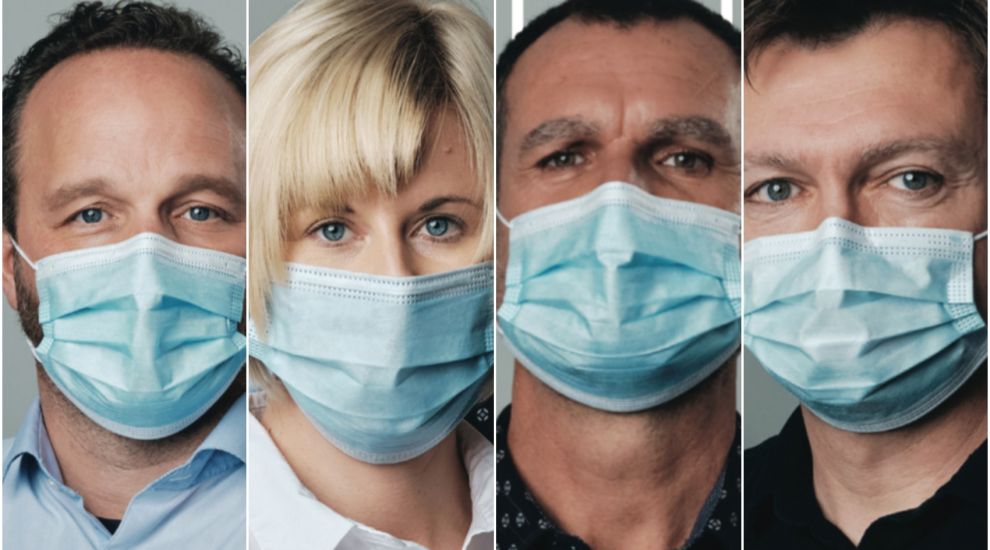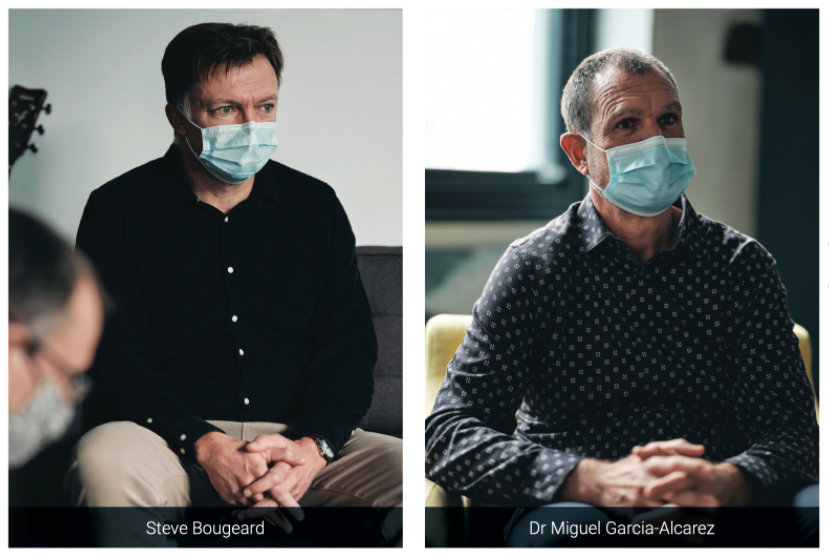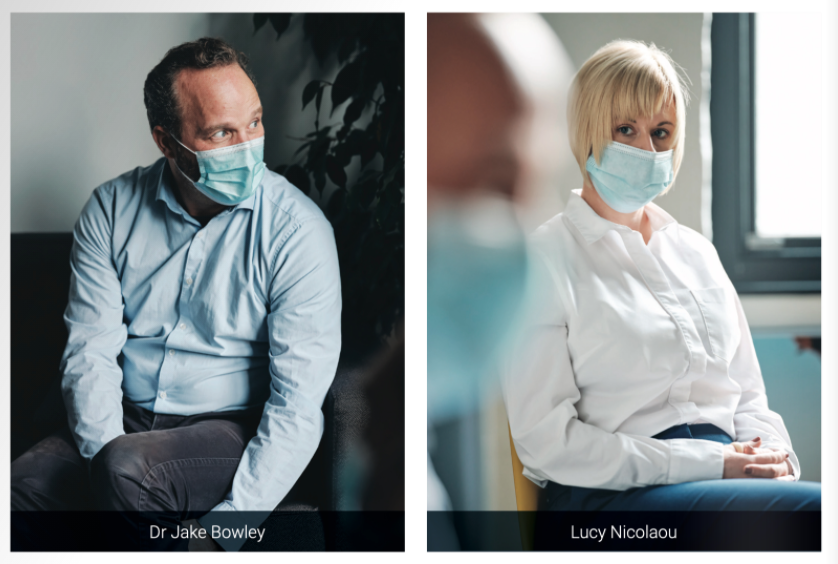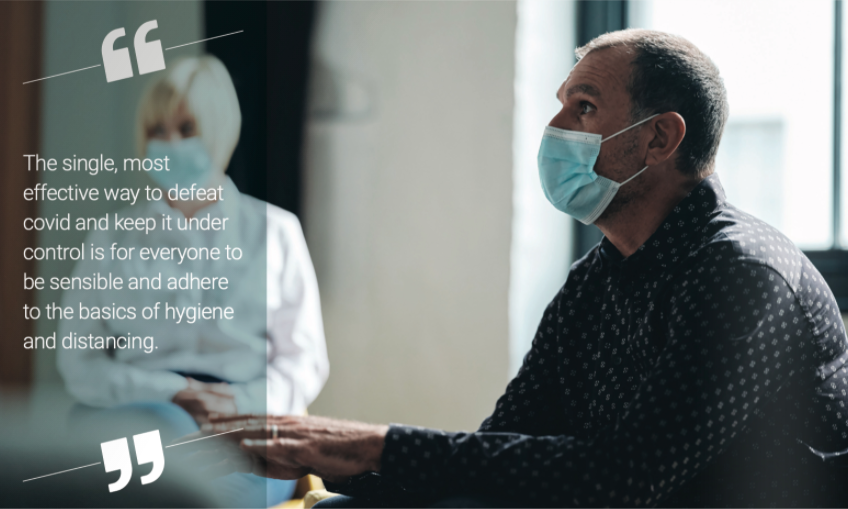


Most of us will know the physical symptoms of covid-19...but what is its cost on us mentally, both individually and collectively as an island community?
Services addressing our mental wellbeing have seen a rise in the number of islanders asking for help since the lockdown, and many have spoken about the fear, anxiety and stress of the changed world we live in.
Express met four mental health practitioners on the front line to talk about how the pandemic has changed the way we think and behave...
Dr Jake Bowley, Consultant Clinical Psychologist: From the evidence of previous pandemics, there seems to be different phases of what organisations and communities go through. There is an initial acute phase following a crisis, where everything is quick, reactive, urgent and frantic. Some of the changes are good; some of them are bad, but everyone pulls together, because there is an expectation that you’re making a difference.
But then it transitions into more longer-term problems, and you move into the recovery phase. It is challenging then because people are more tired and they’re less willing to give responsibilities up to other people. Some people think: “Well, do we need to be locked up anymore?” so it all becomes more complicated.
And that is when frustrations come out more. At the start, people are more willing to pull together but now it’s more “Oh, really. Do I actually have to do that?”
The hard work comes when you move into the recovery phase … when people say: “I’m tired, I’m exhausted, I’m angry. What do I want to do with my life?” which were temporarily suspended at the beginning. We have been planning our responses to that phase, which I think has arrived. And if we have to lockdown again, people will see it as very different from the last time.
Steve Bougeard, Senior Psychological Therapist and Team Lead for Jersey Talking Therapies: You get risk normalisation too: the longer it goes on, the more people relax, because there isn’t the proximity to the actual covid cases. It’s only 1%-2% of the population who have caught it, and that’s where the frustration comes as well. People feel that the risks don’t warrant the restrictions on our lives.
Dr Jake: And there is a difference between groups too: for young people, socialising is a far bigger part of their lives, so restrictions have a far greater impact. But if I’m married with kids, I don’t get to the pub that often, so the restrictions don’t have much impact on my day-to-day life. Young people have less of a buy-in because there is more of a cost.

Dr Miguel Garcia-Alcarez, Consultant Psychiatrist: The only group which really benefited from the lockdown were those who suffer from social phobia or anxiety. They told us that they loved being told that they had to work from home and, suddenly, those who struggle in their everyday life started to thrive. They slept better and functioned better but, apart from them, everyone else has struggled to some degree.
Some elderly people have become scared, because they were told that they are at the highest risk so should isolate more. And at the other end, you have children, who were unable to go school and now they are feeling apprehensive and unable to function as a group. For teenagers, what do they do now at the weekends?
Lucy Nicolaou, Head of LINC Services and Jersey Listening Lounge: At the Listening Lounge, we have seen different presentations at the different stages of the pandemic. At the start, there was real increased anxiety, and people who already had an existing mental health problem were experiencing an exacerbation of their symptoms.
As restrictions have eased, and people have tried to return to a sense of normality, we have seen a shift in what people are contacting us with, and we are seeing more of the social-economic fallout, including people who have had changes to their employment, housing or finances, or disruption to childcare etc. It is starting to cause stress, concern, worry and anxiety for people. We are seeing a lot of that at the moment.
When we talk about what is to come in terms of economic issues, it is probable to expect that we are going to see a lot more people who are impacted in that sense, unfortunately.
Dr Jake: I can see it both ways. With every new restriction, some people say: “I don’t think they go far enough. Why are we locking down?”, while others say: “These are going too far and are badly impacting me.” There are a lot more shades of grey in terms of what people view about risk. For some people, the risk of isolation will be more than the potential risk of getting covid.
We know loneliness has a significant impact on mortality. I read somewhere that being lonely is the equivalent of smoking 15 cigarettes a day; it is that measurable and we can see that covid is having an impact on lots of people.
Dr Miguel: People cope with a situation in different ways and, unfortunately for some, that is alcohol and illegal substances. Not having access to those substances can also have a hugely negative impact, both mentally and financially. Domestic violence and dangers around vulnerable children are also issues.
Lucy: I think re-framing is a good place to start. We have had conversations recently, particularly around masks. For some people, it is little more than an inconvenience, but for others it can feel really rather oppressive.
If you consider it in the context of self-determination and us having choice and control over our daily lives - which at the moment has been impacted by all the restrictions - it can feel quite disempowering.
But wearing a mask, maintaining distancing and following the other restrictions that we’re being asked to abide by are actually really simple and effective steps that we can all take to retain some form of control.
Re-framing it in that context can be remarkably empowering. Looking at situations that we find quite distressing in a new light can be really helpful for our overall wellbeing.

Dr Jake: Jersey has a lot going for it when it comes to people coming together to support each other and work as a community. We had the national wave of community work, such as clapping for the NHS, but actually now it is about how can we do that locally; how can we build up our own sense of communities.
This can be wearing a mask to protect others and looking after people around us, being compassionate, kind and realising that in these times of challenge, stress and frustration, we are going to get irritable and angry.
But you don’t have to close these emotions down. In the first stage, it was: ‘Keep Calm and Carry On’ but you can’t do that for a long time; you have to start moaning and complaining and getting angry and frustrated.
If you hold on to the values of kindness and compassion, it helps you get past that. ‘I might be hacked off at having to wear a mask, but you know what, the reason I’m doing this is because I don’t want people to get ill and I want to help them in whatever way I can. You don’t have to have one without the other: you don’t have to be calm to do the right thing.
We have services that are set up to deal with people at the worst points of crisis but the vast majority of people who go through stress, anxiety, fear and challenge - and let’s be honest, that is everybody - don’t come anywhere near services. How do they cope and manage?
The answer is around the resilience of family and communities, which is obviously more challenging at the moment. In Jersey, half the population aren’t from the Island and the ability to connect with our friends and family abroad has been limited, so there are pressures there.
Dr Miguel: My father is 82 and I last saw him a year ago and I don’t know when I’m next going to see him. I am a psychiatrist, but I am a human first and foremost. We have become used to being able to get the ferry or fly over but actually the island can feel very remote at times.
Steve: There is a body of literature on the positive growth that can come after trauma, stress and pressure, and it can clarify what is important. At Jersey Talking Therapies, we are certainly seeing a lot of our clients reassessing their values and thinking about what is important to them.
Dr Miguel: Not just among our clients, but among ourselves! This pandemic has brought us all to the same level. We are caring for a section of society, but we are, in many ways, on the same journey as them.
Lucy: The pandemic has been a catalyst in many ways. In a wider sense, we are reassessing how we do connect and work together. In the last six months, the way our services and other agencies are working together has really changed. As awful as covid is, it has created opportunities and an urgency that has led to lots of actions that perhaps wouldn’t have happened at the speed they have done.
Dr Jake: It has certainly raised the profile of mental wellbeing. Equally, I think there is a more awareness of physical health too, and the psychological impact of that. We know that our Hospital colleagues are much more focussed on and aware of the impact of covid on mental health and stress than they were before. It has certainly raised the awareness of our wellbeing, moods and feelings as being valid things.
Dr Miguel: However, the effects of covid, unfortunately, are having a disproportionate impact on the less well off, who were already struggling. That will not help tackle the problems over stigma, because those who are really taking the brunt of it are going to feel it even more. They are going to be in a more deprived position, and we have to raise the profile of those individuals and throw a spotlight on the groups that already had those vulnerabilities.
Lucy: Fortunately, services in Jersey are more accessible than they have ever been. There was lots of dialogue at the beginning that we were all in the same boat, but it is now more accurate to say that we’re in the same storm but weathering it in very different boats. For some people, that journey is going to be far tougher than it is for others.
Dr Miguel: And it is important to remember that the storm will pass. Sometimes we get stuck in the now, and it feels like this is how it is forever, but it isn’t, thankfully.
Dr Jake: And to continue the storm analogy, it is how we raft up together to get through it. A boat on its own gets flipped over but by establishing connections we can come through the other side.
In summer, we naturally are more active but then everything winds down for winter. We need to maintain connections but also recognise what makes us less well: drinking more, eating badly, not doing any exercise, sitting watching TV, not sleeping very well, smoking more. They might seem a bit trite because they are so common but if you can stop doing them, it maintains your wellbeing, which is not mental or physical, but both.

Dr Miguel: We have been pushing the clear message that mental health is everybody's business. The single, most effective way to defeat covid and keep it under control is for everyone to be sensible and adhere to the basics of hygiene and distancing. Comparatively speaking, Jersey is in such a privileged position and we need to retain a message of positivity and optimism. There are not many better places to see this through.